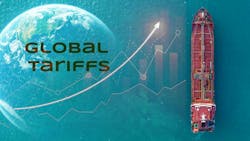The chemical industry’s early verdict on President Trump’s tariffs is uncertainty and trepidation.
SOCMA warns of higher costs, supply chain stress
The Society of Chemical Manufacturers & Affiliates (SOCMA) issued a statement April 3 saying it supports the president’s goals of revitalizing U.S. manufacturing but noted that tariffs will raise feedstock costs for its members.
“As this new tariff framework takes effect, specialty chemical manufacturers face deep uncertainty,” SOCMA stated. “Many SOCMA members are now confronting significantly higher costs for the raw materials they rely on — inputs often unavailable at scale within the U.S. These sudden shifts are occurring in the context of complex, global supply chains and long-standing customer commitments. The stakes are high, and so is the pressure to adapt quickly.”
European chemical groups push back on U.S. tariffs
The unease extends to Europe, home of several large chemical companies, including BASF, Covestro and Air Liquide. Cefic, the EU’s chemical industry association, called the tariffs “unjustified” in a March 27 statement. The organization pointed to a plurilateral agreement in 1994 called the Chemical Tariff Harmonization Agreement that has already established low import duties for both the EU and United States. Cefic called on the two governing bodies to make all efforts to resolve the issues diplomatically.
“Cefic is currently assessing the impact of these new U.S. tariffs on the European chemical industry,” said Ellen Mulder, Cefic’s communications manager, in an email. “The overall impact will also depend on potential countermeasures from the EU and countries like China, as global trade flows are interconnected and disruptions in one area can affect others.”
The tariffs are hidden taxes for consumers and could plunge economies “into destructive confrontations that harm everyone,” the organization added. If the U.S. and EU can’t come to an agreement, Cefic said it supports European Commission efforts to defend the existing mutually agreed rules and European interests.
Moeve, a Spanish energy and chemicals company (formerly Cepsa) deferred to Cefic when reached for comment. The company has been discussing the tariffs internally, shared communications manager Camila Gutiérrez Gil.
“We're still in the process of developing our mitigation plans, so there's little we could contribute at this stage,” she said.
Covestro, based in Leverkusen, Germany, with North American headquarters in Pittsburgh, also stated in an email that it’s still analyzing the impact of the tariffs.
The company said its strong U.S. production base has the company well positioned to continue serving its U.S. customers and beyond.
Global chemical leaders, trade groups share tariff concerns
As of publication time, Braskem, a Brazilian-based thermoplastics producer with over 70 global locations, had not responded to a request for comment on the tariff situation.
In September, S&P Global reported Brazil implemented its own import tariffs on 29 chemical products. The country raised the previous rate of 7.2%-12.6% to 12.6%-20% for a period of 12 months.
Brazilian chemical trade group Abiquim had requested the tariffs to protect against cheap imports, according to the S&P Global article. Braskem is a leading voice as a member of the trade group, ICIS reported.
The Alliance for Chemical Distribution (ACD) recently launched a member-exclusive tariff breakdown webpage to help members understand the impact that tariffs could have on the chemical industry. ACD president and CEO Eric Byer stated that the tariffs place “an enormous economic strain on America’s chemical supply chain.”
Another ACD spokesperson referenced a recent analysis by John Dunham & Associates showing a potential loss of 8,500 jobs for the chemical distribution industry and price increases for products sold through distribution companies of $1.24 billion a year.
The American Chemistry Council (ACC) has been less direct, stating it would review the latest tariff announcements and work with the Trump administration on a pro-growth trade agenda that minimizes the nation’s supply chain vulnerabilities.
“Trade plays a critical role in the U.S. chemical industry’s competitiveness,” ACC noted in an April 2 statement. “As the second-largest export manufacturing sector, the U.S. chemical industry posted a trade surplus of more than $28 billion in 2024, with exports supporting nearly 200,000 domestic jobs.”
Positive signs for U.S.-based suppliers
Meanwhile, the growing U.S. biomanufacturing sector could receive a boost from the tariffs as China currently supplies much of the domestic market. Locus Fermentation Solutions, a Solon, Ohio, company that produces bio-based surfactants for various industries, including the chemical sector, sees a potential opportunity in the tariffs.
“Tariffs present a dual-edged impact for the biomanufacturing space,” said Locus CEO John Uhran. “While rising costs of imports and exports pose a challenge, they also create a significant opportunity for domestic producers like Locus.”
Uhran noted that it’s one of the few U.S.-based biomanufacturers producing TSCA-approved glycolipids at commercial scale.
“We anticipate a shift in the market toward prioritizing U.S.-sourced materials, which strengthens our value proposition and supply chain resilience,” he said.
About the Author
Jonathan Katz
Executive Editor
Jonathan Katz, executive editor, brings nearly two decades of experience as a B2B journalist to Chemical Processing magazine. He has expertise on a wide range of industrial topics. Jon previously served as the managing editor for IndustryWeek magazine and, most recently, as a freelance writer specializing in content marketing for the manufacturing sector.
His knowledge areas include industrial safety, environmental compliance/sustainability, lean manufacturing/continuous improvement, Industry 4.0/automation and many other topics of interest to the Chemical Processing audience.
When he’s not working, Jon enjoys fishing, hiking and music, including a small but growing vinyl collection.
Jon resides in the Cleveland, Ohio, area.

